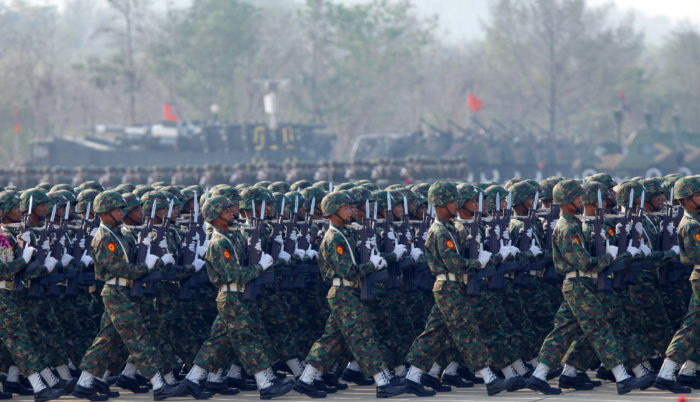![]() Home > Myanmar
Home > Myanmar
Burma Army Troops Serving as UN Peacekeepers in Liberia and South Sudan

Soldiers parade to mark the 70th anniversary of Armed Forces Day in the Burmese capital of Naypyidaw in March 2015. | Photo: Soe Zeya Tun / Reuters
![]() October 2nd, 2016 | 09:42 AM |
October 2nd, 2016 | 09:42 AM | ![]() 1395 views
1395 views
RANGOON, MYANMAR
The Burma Army, also known as the Tatmadaw, currently has a handful of peacekeepers serving in Africa on two peacekeeping missions. The deployments, which began last year, were the first time the Burma Army has contributed to a UN peacekeeping mission in half a century.
According to figures provided by the UN, Burma has had two troops deployed since September last year as part of the United Nations Mission in Liberia (UNMIL), which is tasked with implementing a ceasefire agreement. The pair of Burmese troops are serving as what the UN describes as “experts on mission.” UNMIL has a total of 1,240 troops and 606 police personnel. The bulk of the troops on UNMIL come from Nigeria but several other countries such a Bhutan and Zimbabwe have also contributed personnel.
Burmese troops are also serving in South Sudan, as contingent troops, in a UN mission in the young country which has been plagued by conflict since it achieved independence in 2011. The Burmese deployment in South Sudan began in August of 2015. They have joined a mission of more than 12,500 troops from 61 countries.
In response to a request for comment, the UN Secretary General’s spokesperson’s office forwarded a statement from the UN Department of Peacekeeping. “Myanmar is a new contributor to UN peacekeeping. We are grateful for their contributions and look forward to their increasing participation in our peacekeeping operations in the years to come,” read the statement attributed to a UN peacekeeping official.
In early 2014 it was reported that secretary-general Ban Ki Moon’s special advisory on Burma, the veteran Indian diplomat, Vijay Nambiar, had, during a meeting with the head of Burma’s military Sen-Gen Min Aung Hlaing, invited Burma to resume participation in the UN peacekeeping program. A number of rights group including the New York-based Human Rights Watch quickly denounced the offer.
“The Burmese military’s poor record on rights and civilian protection is profoundly at odds with the standards that UN peacekeepers are expected to defend around the world,” said HRW’s executive director Kenneth Roth in a statement issued at the time “Any move by the UN to recruit Burmese forces risks grave damage to the UN’s reputation and is at odds with recent efforts to elevate human rights concerns within the UN system.”
The Burma Army continues to be engaged in ongoing operations against several armed groups in the north of the country including the Kachin Independence Army, the Ta’ang National Liberation Army, the Shan State Army-North and the Kokang-based Myanmar National Democratic Alliance Army. Recent clashes between the army and a splinter group from the Democratic Karen Benevolent Army have also taken place in Karen State. Rights groups allege that despite the recent change in government, the army continues in its operations to routinely commit serious abuses against civilians including summary executions and rape.
Andrew Selth, an Australian academic and author of several books and papers on Burma’s military believes that Burma’s armed forces would benefit from having their troops take part in UN missions. “If Burma’s security forces are to learn about international norms of behavior, devise better ways of doing things and be exposed to issues beyond their narrow experience, then participation in UN operations offers a way ahead. The alternative is to deny them such opportunities and perpetuate the blinkered thinking that has contributed to Burma’s current problems,” he wrote in a piece that appeared in May 2014 on the Lowy Interpreter, a website operated by the Lowy Institute for International Policy, an Australian think tank.
Burma’s involvement in UN peacekeeping missions comes at a time when the blue helmets are themselves under increased scrutiny following a serious of high profile scandals involving UN peacekeepers around the globe. The UN mission in South Sudan, which Burma is now participating in, was heavily criticized for its failure to come to the aid of a group of international aid workers who were raped by government troops in a compound located very close to the UN base in the capital Juba on July 11.
UN peacekeepers from Nepal, who were stationed in Haiti in 2010, have been identified as the source of a deadly outbreak of cholera in the country which killed more than 10,000 people. The UN only recently acknowledged that the Nepali troops, who were stationed upstream from the village where cholera first broke out, were the source of the lethal outbreak. The world body continues to fight a series of lawsuits filed in the US by lawyers representing victims of the outbreak, who argue that the UN was responsible for the substandard sanitation system at the Nepali troop base which helped trigger the massive health crisis.
Information available on the history of UN peacekeeping on the UN website shows that Burma sent troops to take part in a small number of UN missions during the early days of the global body. Burma contributed troops to a mission to the Congo in the early 1960s. The last deployment of Burmese troops to UN peacekeeping operations appears to have been for a mission created in response to the Indo-Pakistani War of 1965.
Under the mission, which lasted from Sept. 1965 to March 1966, Burmese troops participated as part of an observer force supervising the ceasefire between India and Pakistan, and the withdrawal of forces following the end of hostilities between the two sides.
Source:
courtesy of THE IRRAWADDY
by Seamus Martov
If you have any stories or news that you would like to share with the global online community, please feel free to share it with us by contacting us directly at [email protected]